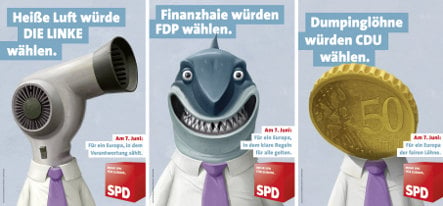A Member of the European Parliament since 1989, Dagmar Roth-Behrendt from the centre-left Social Democrats (SPD) is running in her fifth election campaign. She is one of only five European parliamentarians that Berlin sends to Brussels, and was vice president of the chamber from 2004 to 2007.
The Local: One reason for the notorious voter apathy during European elections is that the party lines seem to be less definable. Once elected, national parties go to Brussels and Strasbourg to form completely new transnational factions in a distant parliament. People don’t really know what they’re voting for – what’s the difference between the European Christian Democrats (SPD) and the European SPD?
Roth-Behrendt: Getting people to vote at all is the hard part. I find it quite easy to make distinctions between the SPD and the CDU, both in Germany and the EU. For example, the CDU in Europe is now beginning to say we need more public jobs, but they have always voted against social policies for the labour market.
The Local: In the last European election in 2004, the SPD won only 21.5 percent of the vote in Germany, while the CDU garnered 36.5 percent. Do you think your social policies are likely to get you more votes this time because of the financial crisis?
Roth-Behrendt: I hope people see the value of the solution we are offering, which is incidentally the same solution we offered before the financial crisis. When Vice-Chancellor [and SPD Chairman] Franz Müntefering compared bankers and managers to a plague of locusts three years ago, it caused a massive storm of protest. No one talks about that anymore, because corporate greed has become so obvious.
The Local: Why is the European Parliament specifically important for voters in Germany?
Roth-Behrendt: This is another message that it is hard to get across, partly because of the media. My favourite argument on this question is that the politics we do in Europe is domestic politics. We make decisions about air quality, emissions, food hygiene – these are all decisions which can improve the quality of our lives. It is a point sometimes missing from the press.
About a year ago, we decided that train passengers in Europe should have a right to compensation if the train is late. The German parliament has now made this into a formal law, and the media reported a lot about the new passenger’s rights. Not a single breath was wasted on mentioning the European Parliament. That makes it very difficult, and the members of the German parliament aren’t likely to say “Thanks very much to Brussels and the European Parliament” either. It would be nice if they did.
The Local: Many people have the feeling that the EU is too bureaucratic …
Roth-Behrendt: There are fewer bureaucrats in the EU than in the city of Berlin, fewer even than in a medium-sized German city like Frankfurt, and that is for more than 500 million people. The budget has to be decided, the laws have to be prepared – they have to do everything. The public has so many gut feelings about the EU that are just wrong.
The Local: Another common objection to the EU election is that the parliament is irrelevant, as it does not have the power to make laws, or to form a government.
Roth-Behrendt: That’s just another one of those lazy arguments. It’s true that the parliament does not formally have the power of legislative initiative. We deliberately didn’t write this into the treaties because we didn’t want the European Council [comprised of the governments of member states] to mutate into a too powerful second chamber. The European Council can advise the European Commission [the executive branch of the EU] on legislature, but so can the parliament.
In a national parliament that has formal power of legislative initiative, a single representative is subservient to a party line that stifles any original ideas, even if he or she is in government. In opposition you can just about forget having any influence on policies. I don’t feel any less influential because we don’t have this power.
The Local: Why has the SPD run such a negative campaign in the posters hung around Berlin, such as “Financial sharks would vote FDP”?
Roth-Behrendt: I didn’t find them negative, did you find them negative? I found them very, very good, because they get their message across so well. If you want as little regulation of the capital market as possible, if you want manager bonuses to be tied to short-term, rather than long-term profits, then vote [for the pro-business Free Democrats]. That is the voice of the past. Anyway, I thought it was a cute shark.


 Please whitelist us to continue reading.
Please whitelist us to continue reading.
Member comments